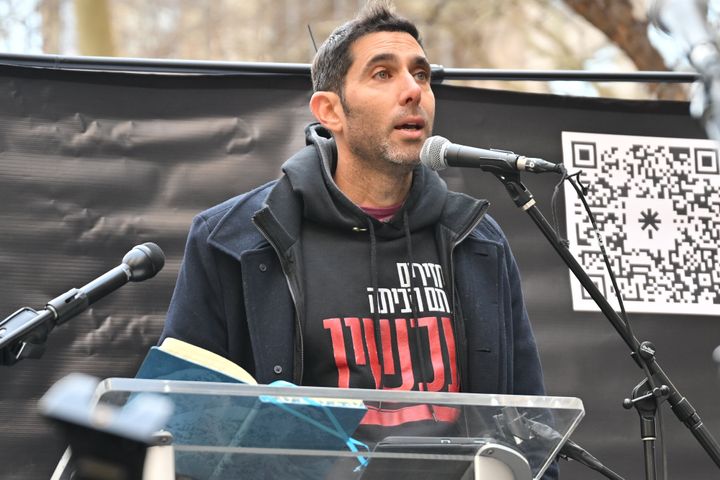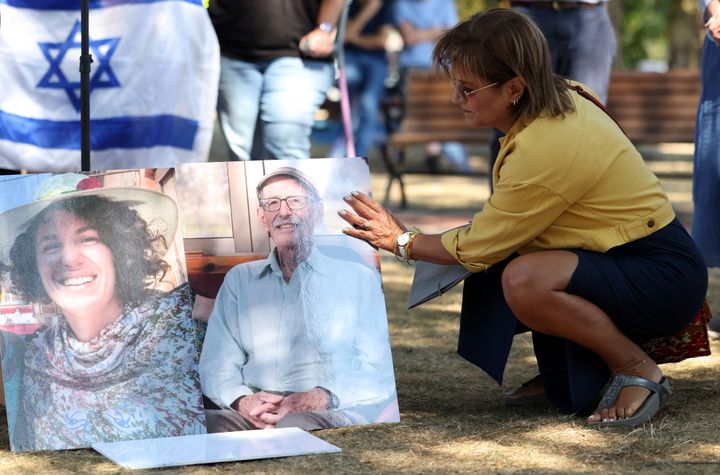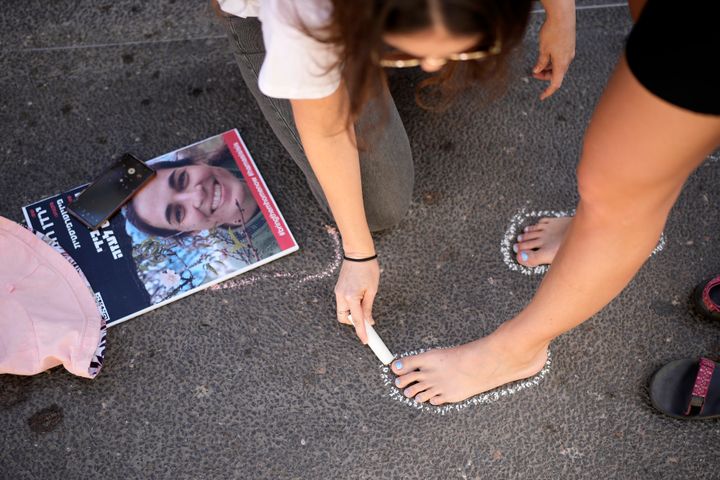One family’s story offers a snapshot of the devastating impact of the Oct. 7, 2023, attack inside Israel — and the agonizing personal toll that choices by Hamas, Israel and the U.S. have taken in the year since.
Members of the Palestinian militant group overran Kibbutz Be’eri that day, ravaging the town, killing more than 100 of the community’s 1,100 residents, including children, and kidnapping hostages to take back to the Gaza Strip.
The Gats were among the families whose lives were upended in the attack. Hamas fighters pulled Kinneret Gat, 67, out into the streets and eventually shot her. They abducted Kinneret’s daughter Carmel Gat, 39. Another group of assailants took Kinneret’s son Alon Gat, daughter-in-law Yarden Roman-Gat, and their 3-year-old daughter. Alon escaped with the toddler before they reached Gaza, but Yarden, 36, remained captive.
The family only learned of Kinneret’s death after seeing a video Hamas posted of her execution. Several weeks later, Yarden was reunited with her loved ones as part of a prisoner swap between Israel and Hamas negotiated by the U.S. and Qatar.
Then, this September, the Israeli military said it had finally located Carmel, dead. An autopsy showed that she and five other hostages, among them American citizen Hersh Golberg-Polin, were shot at close range in the back of their heads hours before Israeli forces discovered their bodies in a tunnel in Gaza.
The fate of the six murdered hostages inflamed criticism of the Israeli government’s strategy of not only continuing but expanding attacks in the region, which some officials argue will force Hamas to cut another deal.
Hostage families disagree. “Military pressure kills the hostages,” Carmel Gat’s cousin Gil Dickmann told Reuters a few days later. More than 100 hostages remain in Gaza.
This week, HuffPost spoke with Gili Roman, Yarden Roman-Gat’s brother and one of thousands of Israelis who have spent a year mobilizing for the release of all the captives. He conveyed exhaustion with the government’s present strategy and hope that the U.S. can drive a change in course as a key player with unique leverage in Israel-Hamas negotiations.
“We expect to see the release of the remaining hostages as the main account for the heavy price paid by Carmel due to the failure to bring her safely home alive,” Roman wrote in a Tuesday email. “We don’t want to see more death as a result.”
Only freedom for all hostages “can truly help us heal,” he added, describing the current state of diplomacy as “the low point of a long decline in the two sides’ commitment to the prospective deal.”

Over months of negotiations, Israeli Prime Minister Benjamin Netanyahu has repeatedly torpedoed potential bargains at the last minute, according to independent reporting. Many Israelis and American officials, as well as analysts, believe Netanyahu is less concerned with the captives than with the political benefits of continuing the post-Oct. 7 war.
The Israeli leader “has written off the hostages,” a U.S. Senate aide told HuffPost a month after the Hamas-led attack.
Israeli and U.S. officials have also frequently accused Hamas of being unwilling to compromise, with Israeli military sources suggesting its leader Yahya Sinwar is treating hostages as human shields.
On July 31, Israel assassinated Hamas political chief Ismail Haniyeh, a significant player in the talks, raising fears that it would become even harder to reach a settlement. Since September, U.S. officials have cast doubt on the chances of a deal, while President Joe Biden and Vice President Kamala Harris continue to say they are focused on achieving one.
“The route taken by the negotiators has failed… We expect to see new comprehensive ideas and a bigger amount of pressure,” Roman wrote. “Failing to bring back home Americans held by a terror organization is a mark on U.S. policy and strength that can be partly removed only by a firm involvement with a clearcut result – the release of all hostages before the new year.”
The group still in captivity includes four U.S. citizens.

On the anniversary of the Oct. 7 attacks, the Qatari government – which allows leaders of Hamas to live in the country and helps facilitate the negotiations — newly called for an agreement to free hostages and attain a cease-fire in Gaza, where local health officials say at least 41,000 Palestinians have been killed by Israel’s military campaign.
“There is regret for the missed opportunities to end this brutal war through peaceful means, to alleviate the suffering, and to bring the hostages home,” Meshal bin Hamad Al Thani, Qatar’s ambassador to the U.S., wrote in Newsweek.
“In Gaza, we have come close to a deal before, and we believe that through sustained effort and a good-faith commitment from all parties, peace can be achieved. However, this requires a willingness from all sides to embrace diplomacy and to recognize that the path to lasting security lies in dialogue, not destruction.”
Roman told HuffPost that his extended family marked the anniversary in different ways.
Yarden Roman-Gat and close relatives left Israel for a getaway “during these tense days,” he wrote. Her husband, Alon Gat — Carmel’s brother and Kinneret’s son — joined a delegation to Germany to speak at memorial events. Or Gat, another brother of Carmel’s, participated in a commemoration organized by several hostage families in Tel Aviv that was notably separate from the official state ceremony featuring Netanyahu.
Many relatives of hostages and their allies have protested and criticized the Israeli leader throughout the war.

As hostage release and cease-fire negotiations appear stalled, the increasingly deadly Israeli battle with Lebanese militants Hezbollah is devastating Lebanon and bolstering fears of a full-scale regional conflict, and the U.S. presidential election is drawing more global attention as November nears.
“I assume that all [hostage families] are stressed and discouraged by the course of events which put the issue of the hostages to the side-lines,” Roman wrote.
Still, he feels the developments could challenge the sense of “stagnation” and “might be a chance to change the overall picture… only if our side, our governments, would constantly keep in mind [their] commitment for the hostages. That must be a priority.”
Either Vice President Kamala Harris or Republican presidential nominee Donald Trump could present a “fresh approach,” Roman told HuffPost. But he noted that for the next several months, President Joe Biden retains the power to make a difference, including after voters cast their ballots, when Biden would incur less political risk if he shifts U.S. policy toward Israel.
“President Biden has two crucial months of leadership after the elections in which he could be more free,” Roman wrote, citing Biden’s “deep commitment to the hostages’ fate.”
Roman and other hostage release advocates have repeatedly traveled to the U.S. to build momentum for a deal, reflecting the sense among Israelis that Biden could wield huge influence, given Israel’s reliance on U.S. support.
“I want to believe [Biden] won’t be willing to step down without doing his best to push for a last attempt to save them before January,” Roman said.
Disclaimer: The copyright of this article belongs to the original author. Reposting this article is solely for the purpose of information dissemination and does not constitute any investment advice. If there is any infringement, please contact us immediately. We will make corrections or deletions as necessary. Thank you.
